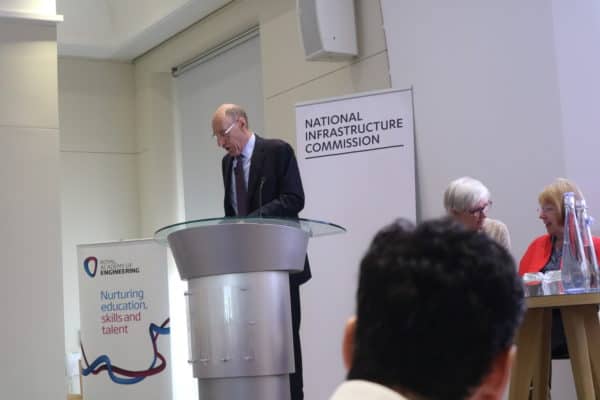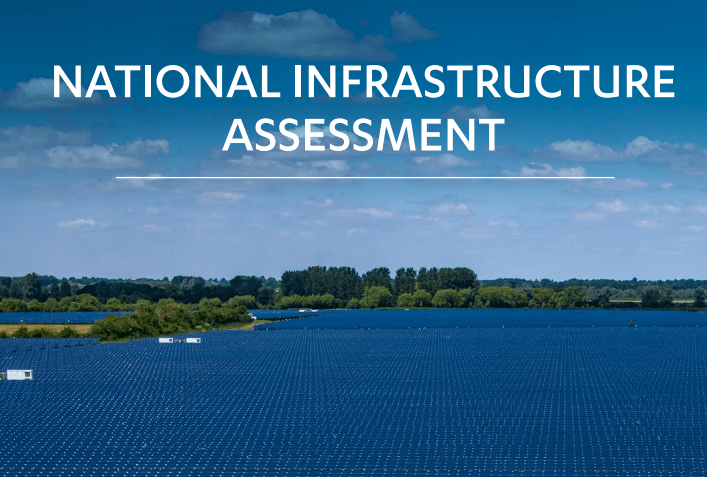England should use Wales as an example for increasing national household recycling rates, an economist at the NIC suggested.
The NIC launched its 30-year infrastructure report earlier today, which will be updated every five years and set out a list of recommendations for the government, who are legally obliged to respond to the document within six months.
The report covered a range of sectors, including transport, energy and digital, as well as waste.

The NIC, which was set up by the government in 2015 to provide an independent infrastructure assessment, stated that in order to mitigate the need for large infrastructure investment, more needs to be done to tackle difficult to recycle plastics; as well as increase the levels of food waste collections under a single collection system for the whole country.
And, speaking to letsrecycle.com earlier today (10 July) after the launch event, Tom Bousfield, economist at the NIC who focuses on waste, said England should be looking to Wales as an example for doing so.
“I think the broad message out of the report is that the government should act now, the household recycling rate is just above 44% in England. Yes, there are definitional differences, but it is higher in Wales and really that should set the level on ambition,” he explained.
Mr Bousfield added: “The commission has not just set policies on standard collection regimes but also set out financial support in the transition.”
World leader
The NIC labelled Wales a “world leader” in recycling, pointing to statistics produced by consultancy firm Eunomia in 2017, which said Wales has a similar recycling rate to England in 2008, at around 40%, but now has the third highest in the world, at 64%.
The NIC said that this was achieved through mandating the collection of food waste, setting ambitious targets for local authorities and a providing a blueprint for standardised collection of other materials.
Mr Bousfield added that while some of the targets outlined in the report are ambitious, he hopes, if adopted, they can have a similar effect on UK recycling rates.
Commenting on the 75% plastics recycling target the report recommended to the government, Mr Bousfield said: “It’s definitely difficult, it is designed to be but it can definitely be achieved. In order to do so you need to improve the quality of material on the secondary market and if that doesn’t work then look to ban products that are difficult to be recycled.”
Wish list
At the launch event, in which the NIC team also looked into recommendations such as increased investment in electric vehicles and the country’s broadband speed, chair of the NIC, Sir John Armitt, explained that the recommendations set out in the assessment are achievable.

Sir John said: “Let me be clear. We have not drawn up a wish list aimed at satisfying as many people as possible, It is much broader than that. ” he explained.
He added: “It sets out, clearly, the need to make what we think right answers may be to a range of problems. The recommendations are affordable within the resources set out by the government and provide a fully costed plan for infrastructure spending without additional cost to billpayers.”
Recommendations
The Commission recommended that government should set a target for recycling 65% of municipal waste and 75% of plastic packaging by 2030. Government should set individual targets for all local authorities and provide financial support for transitional costs, it added.
Today’s report said that the government should establish:
- A Clear two symbol labelling (recyclable or not recyclable) across the UK by 2022.
- A consistent national standard of recycling for households and businesses by 2025.
- Restrictions on the use of hard-to-recycle plastic packaging (PVC and polystyrene) by 2025.
- Incentives to reduce packaging and for product design that is more easily recyclable by 2022.
- A common data reporting framework for businesses handling commercial and industrial waste by the end of 2019, ideally through voluntary reporting but if necessary by legislation.
Related link
National Infrastructure Commission report






Subscribe for free